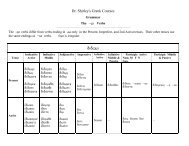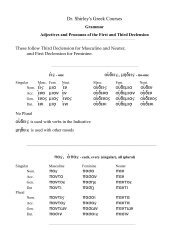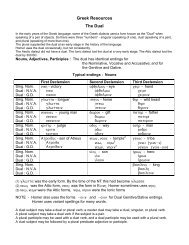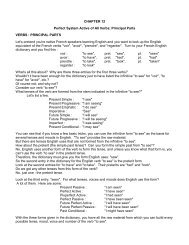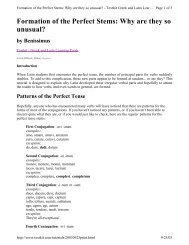How to Translate a Sentence - Dr. Shirley's Site
How to Translate a Sentence - Dr. Shirley's Site
How to Translate a Sentence - Dr. Shirley's Site
You also want an ePaper? Increase the reach of your titles
YUMPU automatically turns print PDFs into web optimized ePapers that Google loves.
Example : Hebrews, chapter 1, verses 1-4<br />
This sentence is quite complicated - you will not have <strong>to</strong> deal with this degree of<br />
complexity until the 400-level language courses. I am using it as an example <strong>to</strong> show how<br />
even long and complex sentences can be analyzed and translated.<br />
English :<br />
God, who at sundry times and in diverse manners spake in times past un<strong>to</strong> the fathers by<br />
the prophets, hath in these last days spoken un<strong>to</strong> us by his Son, whom he hath appointed<br />
heir of all things, by whom also he made the worlds; who being the brightness of his glory,<br />
and the express image of his person, and upholding all things by the word of his power,<br />
when he had by himself purged our sins, sat down on the right hand of the Majesty on<br />
high; being made so much better than the angels, as he hath by inheritance obtained a more<br />
excellent name than they.<br />
Greek :<br />
Polumerwj kai polutropwj palai o( Qeoj lalhsaj <strong>to</strong>ij patrasin e0n<br />
<strong>to</strong>ij profhtaij e0p' e0sxa<strong>to</strong>u twn h(merwn <strong>to</strong>utwn e)lalhsen h(min e0n ui(w|,<br />
o(n e0qhken klhronomon pantwn, di' ou( kai e)poihsen <strong>to</strong>uj ai)wnaj: o(j w)n<br />
a)paugasma thj dochj kai xarakthr thj u(postasewj au)<strong>to</strong>u, ferwn te<br />
ta panta tw| r(hmati thj dunamewj au)<strong>to</strong>u, kaqarismon twn a(martiwn<br />
poihsamenoj e0kaqisen e0n decia| thj megalwsunhj e0n u(yhloij, <strong>to</strong>soutw|<br />
kreittwn genomenoj twn a)ngellwn o(sw| diaforwteron par' au)<strong>to</strong>uj<br />
keklhronomhken o)noma.<br />
Latin :<br />
Multifariam, multisque modis olim Deus loquens patribus in prophetis: novissime, diebus<br />
istis locutus est nobis in Filio, quem constituit haeredem universorum, per quem fecit et<br />
saecula; qui cum sit splendor gloriae, et figura substantiae eius, portansque omnia verbo<br />
virtutis suae, purgationem pecca<strong>to</strong>rum faciens, sedet ad dexteram maiestatis in excelsis:<br />
tan<strong>to</strong> melior angelis effectus, quan<strong>to</strong> differentius prae illis nomen haereditavit.<br />
i. Clauses : look for relative pronouns <strong>to</strong> help find clauses :<br />
"who . . . prophets" (The Greek and Latin passages use an Aorist or Past participle ("having<br />
spoken") instead of a Relative Pronoun - English uses a Relative Pronoun, "who", - "who" is the<br />
nominative, so is describing the Subject of the sentence)<br />
"whom . . . things" "o(n . . . pantwn", "quem . . . universorum" - the Relative Pronoun is in<br />
the accusative, so this phrase is describing the Object of the sentence.<br />
"by whom . . . worlds" " di' ou( . . .<strong>to</strong>uj ai)wnaj" "per quem . . . saecula; - the Relative<br />
Pronoun is qualified by a preposition indicating "the agent by which someone did something"<br />
"who . . .sat down . . on high" "o(j . .e0kaqisen . .e0n u(yhloij" " qui . . sedet . . in excelsis:"<br />
A long clause, containing a subsidiary clause and several subsidiary phrases, describing "Son"<br />
"being made so much better than the angels" "<strong>to</strong>soutw| kreittwn genomenoj twn a)ngellwn:"<br />
" tan<strong>to</strong> melior angelis effectus" - this is a phrase rather than a clause (no finite verb) containing a



